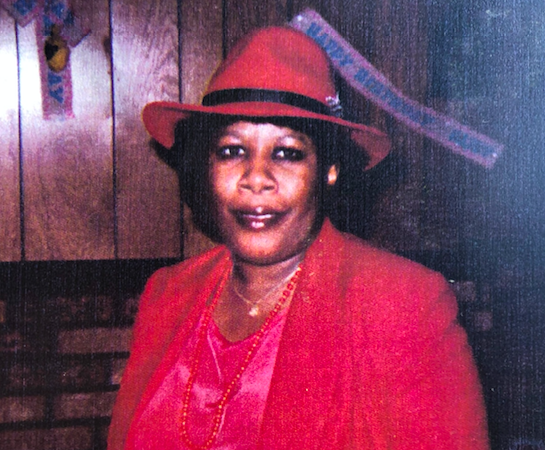
A tenant who lived in the Fillmore Street building that Vallie Brown bought in 1994 told me today that Brown’s account of what happened 25 years ago was inaccurate.
Brown has argued that when she bought the building, the tenants were not paying rent, the place was falling apart, and that she simply asked the tenants to pay reasonable rent to cover repairs. If they had accepted that proposal, they could have stayed.

But Mary Packer, who had lived in the building since the early 1970s, told reporters today that she was paying rent — $205 – every month. She sent the check, she said, to the niece of her longtime landlord, who was living in Long Beach.
I was unable to reach the woman Packer said she was paying rent to.
Her apartment, she said, was far from uninhabitable – she said that before Brown and three friends bought the place, repairs were made whenever anyone complained. “I loved my apartment,” she said.
Packer said that she never met Brown, who never contacted her except through letters that told her she was being evicted. “She didn’t introduce herself,” Packer said.
Packer, who worked for 22 years as an administrative assistant at Wells Fargo as well as at Thrifty and the Automobile Association of America, said that there was no attempt to contact her to negotiate any rent increase or any terms for staying in the building.
“She never negotiated with us, she never asked us for more rent,” Packer said.
Packer said that she didn’t come forward until she read the story in the SF Weekly with Brown’s statements, including:
Brown says they needed more income from the tenants to pay for building renovations to address problems like mold, and that she tried to work with the tenants so that they could stay. When they couldn’t settle on a rent amount, she and her co-owners moved to evict them.
“I hit the ceiling,” Packer said. “I knew I had to come forward and say something. She said I wasn’t paying rent, and I have always paid my rent.”
After the eviction, she said, she had to put here furniture in storage and move in with her godmother until she found another apartment in the Haight – at $650 a month, more than triple the rent she had been paying.
“This was not handled well at all.”
Here’s Vallie Brown’s statement on the situation:
Dean Preston and his allies are desperate to make this about events 25 years ago, rather than his own current record of obstructing affordable housing in District 5. The tenant in question was asked to stay, and chose not to. Her apartment had wood paneling everywhere, and when they took down the panels there was mold throughout the walls. After Vallie and her housemates removed the mold and fixed up the apartment, they rented it to a new tenant. That was when the former tenant thought better of her decision and tried to contest what had happened. She was offered an apartment in the building but declined, instead taking a payout of about $30,000. The new renter who moved in was a low-income tenant living on SSI. His rent was paid by the Ryan White Foundation, he lived in the apartment for the next 19 years, and remains a close friend to Vallie to this day.
Further, it seems that her recollection of events differs in other ways than what actually happened. When Vallie and her housemates purchased the building, they were told by the probate lawyer who controlled the property that none of the tenants had paid rent in years, and she certainly did not pay after the change in ownership. When Vallie moved in, Thomas Cotton was not living in the building. He was living around the corner in another building and simply using one of the apartments for storage because he was going to move to Florida where his wife, Elinor, had already moved and he was going to follow her there. Vallie and her housemates helped him move his possessions into storage in the garage and gave him a key. For months before he moved, he stopped by most days to share a cup of coffee with Vallie. It’s likely the former tenant saw him, but apparently she wasn’t aware that he didn’t live there.
I ran this by Packer, and she was outraged. “They offered me no other apartment,” she said. “I didn’t find any mold. Brown never even talked to me, not once. If I had been offered an apartment I would still be there today.”
She said that she was not contacted by the Preston campaign; she contacted the campaign herself after she read the Weekly story.
Once somebody gets an eviction notice, they typically stop paying rent.
Packer was involved in litigation, and apparently received a settlement – well after she had left the apartment. Packer said that because of the terms of the settlement, she can’t discuss it.
Tom Cotton challenged his eviction before the Rent Board.
Preston, by the way, said that he’s spent his entire adult life fighting for affordable housing, in the district and across the city and the state. He and Brown disagree on whether private market-rate developers are a big part of the solution to the housing crisis.

